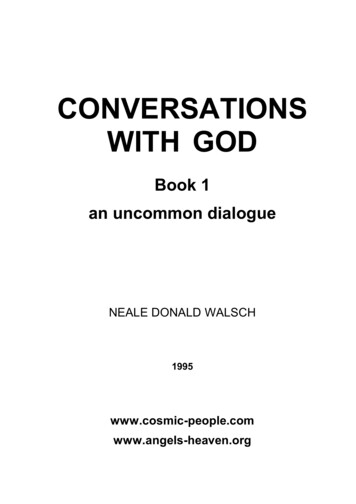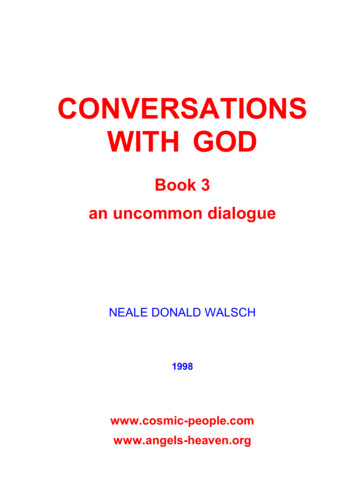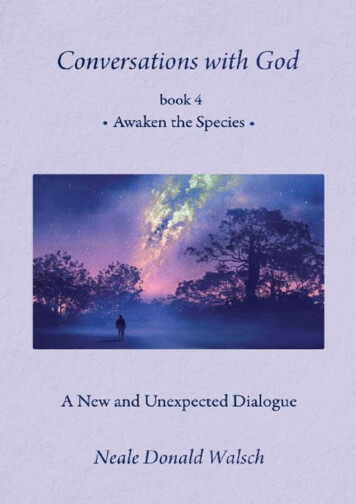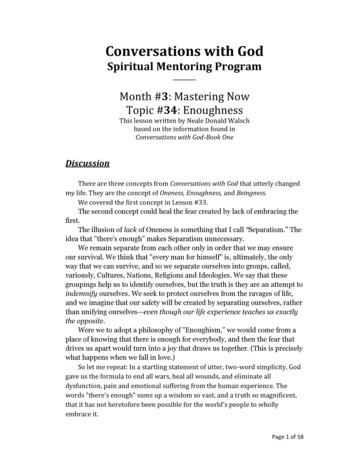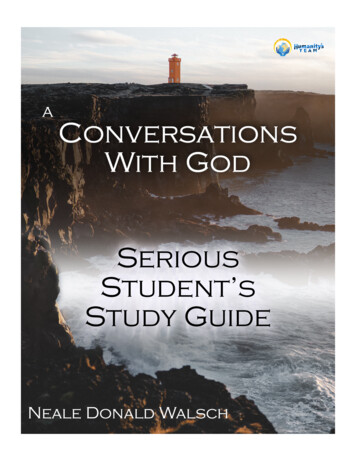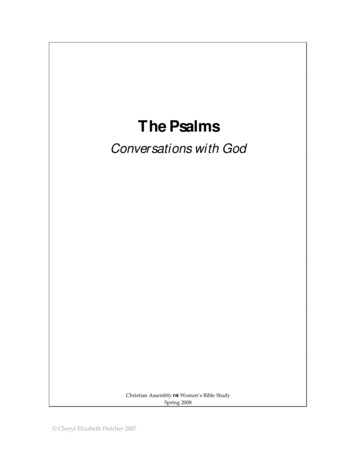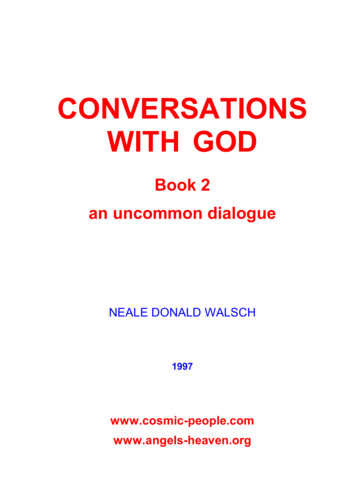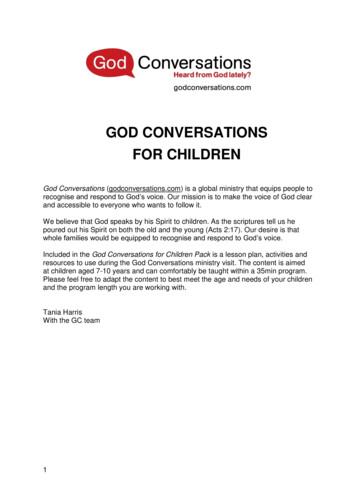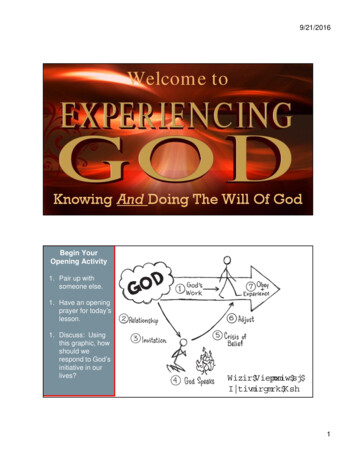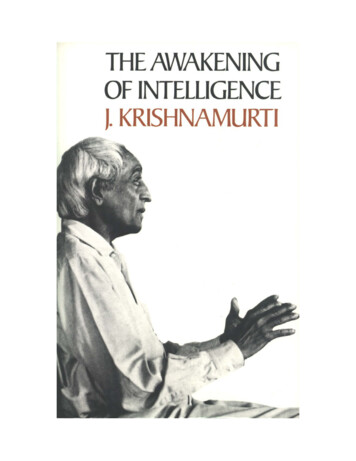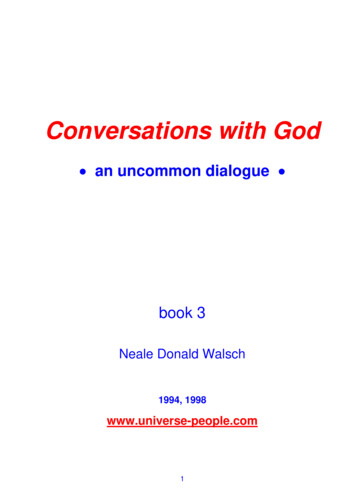
Transcription
Conversations with God an uncommon dialogue book 3Neale Donald Walsch1994, 1998www.universe-people.com1
Books by Neale Donald WalschConversations with God, Book IConversations with God, Book 1Guidebook Conversations with God, Book 2Meditations from Conversations with God, Book IMeditations from Conversations with God, Book 2,A Persona! JournalThe Little Soul and the SunConversations with God an uncommon dialogue book 3Neale Donald Walsch1998 by Neale Donald Walsch2
ForNANCY FLEMING-WALSCHBest friend, dear companion,passionate lover, and wonderful wife,who has brought me and taught memore than any human beingon Earth.I am blessed in theebeyond my highest dream.You have made my soul sing again.You have shown me lovein miracle form.And you have given meback to myself.I humbly dedicate this book to you,my greatest teacher.AcknowledgmentsAs always, I wish first to thank my best friend, God. I hope one day that everyone can have afriendship with God.Next, I acknowledge and thank my wonderful life partner, Nancy, to whom this book isdedicated. When I think of Nancy, my words of gratitude seem feeble next to her deeds, and Ifeel stuck with not being able to find a way to express how really extraordinary she is. Thismuch I know. My work would not have been possible without her.3
Then, I wish to acknowledge Robert S. Friedman, publisher at Hampton Roads PublishingCompany, for his courage in first placing this material before the public in 1995, and in publishing all volumes of the CWG trilogy. His decision to accept a manuscript that was rejectedby four other publishers has changed the lives of millions.And I can’t let the moment of this last installment in the CWG trilogy pass withoutacknowledging the extraordinary contribution to its publication made by Jonathan Friedman,whose clarity of vision, intensity of purpose, depth of spiritual understanding, endless well ofenthusiasm, and monumental gift of creativity is in large measure the reason Conversationswith God made its way to bookshelves when it did, how it did. It was Jonathan Friedman whorecognized the enormity of this message and its importance, predicting that it would be readby millions, foreseeing that it would become a classic of spiritual literature. It was hisdetermination which produced the timing and design of CWG, and his unwavering dedicationwhich had much to do with the effectiveness of its initial distribution. All lovers of CWG areforever indebted to Jonathan, as am I.I wish to thank Matthew Friedman also, for his tireless work on this project from thebeginning. The value of his co-creative efforts in design and production cannot be overstated.Finally, I want to acknowledge some of the authors and teachers whose work has so alteredthe philosophical and spiritual landscape of America and the world, and who inspire me dailywith their commitment to telling a larger truth regardless of the pressures and personalcomplications that such a decision creates.To Joan Borysenko, Deepak Chopra, Dr. Larry Dossey, Dr. Wayne Dyer, Dr. ElisabethKübler-Ross, Barbara Marx Hubbard, Stephen Levine, Dr. Raymond Moody, James Redfield,Dr. Bernie Siegel, Dr. Brian Weiss, Marianne Williamson, and Gary Zukav—all of whom Ihave come to personally know and deeply respect—I pass on the thanks of a grateful public,and my personal appreciation and admiration.These are some of our modern day way-show-ers, these are the pathfinders, and if I havebeen able to embark on a personal journey as a public declarer of eternal truth, it is becausethey, and others like them whom I have not met, have made it possible. Their life work standsas testimony to the extraordinary brilliance of the light in all our souls. They havedemonstrated what I have merely talked about.IntroductionThis is an extraordinary book. I say that as someone who has had very little to do with writingit. All I did, really, was “show up,” ask a few questions, then take dictation.That is all I have done since 1992, when this conversation with God began. It was in that yearthat, deeply depressed, I called out in anguish: What does it take to make life work? Andwhat have I done to deserve a life of such continuing struggle?I wrote these questions out on a yellow legal pad, in an angry letter to God. To my shock andsurprise, God answered. The reply came in the form of words whispered in my mind by aVoiceless Voice. I was fortunate enough to have written those words down.I have done so now for over six years. And since I was told that this private dialogue wouldone day become a book, I sent the first batch of those words to a publisher late in 1994. Theywere on store shelves seven months later. At this writing that book has been on the NewYork Times bestseller list for 91 weeks.The second installment in the dialogue became a bestseller as well, also making the Timeslist for multiple months. And now, here is the third and final portion of this extraordinaryconversation.This book took four years to write. It did not come easily. The gaps between the moments ofinspiration were enormous, more than once stretching across half-a-year canyons. The4
words in the first book were dictated over the course of one year. The second book camethrough in just a little over that much time. But this final segment has had to be written withme in the public spotlight. Everywhere I’ve gone since 1996 all I’ve heard has been, “When’sBook 3 coming out?”, “Where’s Book 3?”, “When can we expect Book 3?”You can imagine what this did to me, and what impact this had on the process of bringing itthrough. I might as well have been making love on the pitcher’s mound in Yankee Stadium.Actually, that act would have afforded me more privacy. In the writing of Book 3, every time Ipicked up a pen I felt I had five million people watching, waiting, hanging on every word.All of this is not to congratulate myself on completing this work, but rather, to simply explainwhy it has taken so long. My moments of mental, spiritual, and physical solitude have been,over these most recent years, very few and far between.I began this book in the spring of 1994, and all of the early narrative was written in that timeperiod. It then leaps across many months, ultimately jumping forward a full year, and finallyculminating with closing chapters written in the spring and summer of 1998.On this much you can depend: this book was not forced out, by any means. The inspirationeither came cleanly, or I simply put the pen down and refused to write—in one case for wellover 14 months. I was determined to produce no book at all, if it was to be a choice betweenthat and a book I had to produce because I said I would. While this made my publisher a bitnervous, it went a long way toward giving me confidence in what was coming through,however long it was taking. I present it now, with confidence, to you. This book sums up theteachings in the first two installments of this trilogy. It then carries them forward to theirlogical, and breathtaking, conclusion.If you’ve read the Foreword to either of the first two installments, you know that in each case Iwas a little bit apprehensive. Scared, actually, of what the response to those writings mightbe. I am not scared now. I have no fear whatsoever about Book 3. I know that it will touchmany of those who read it with its insight and its truth, its warmth and its love.I believe this to be sacred spiritual material. I see now that this is true of the entire trilogy, andthat these books will be read and studied for decades, even for generations. Perhaps, forcenturies. Because, taken together, the trilogy covers an amazing range of topics, from howto make relationships work to the nature of ultimate reality and the cosmology of the universe, and includes observations on life, death, romance, marriage, sex, parenting, health,education, economics, politics, spirituality and religion, life work and right livelihood, physics,time, social mores and customs, the process of creation, our relationship with God, ecology,crime and punishment, life inhighly evolved societies of the cosmos, right and wrong, cultural myths and cultural ethics,the soul, soul partners, the nature of genuine love, and the way to glorious expression of thepart of ourselves that knows Divinity as our natural heritage.My prayer is that you will receive benefit from this work. Blessed be.Neale Donald WalschSeptember, 1998Conversations with Godan uncommon dialogue15
It is Easter Sunday, 1994, and I am here, pen in hand, as instructed. I am waiting for God.He’s promised to show up, as She has the past two Easters, to begin another yearlongconversation. The third and last—for now.This process—this extraordinary communication—began in 1992. It will be complete onEaster, 1995. Three years, three books. The first dealt with largely personal matters—romantic relationships, finding one’s right work, dealing with the powerful energies of money,love, sex, and God; and how to integrate them into our daily lives. The second expanded onthose themes, moving outward to major geopolitical considerations—the nature ofgovernments, creating a world without war, the basis for a unified, international society. Thisthird and final part of the trilogy will focus, I am told, on the largest questions facing man.Concepts dealing with other realms, other dimensions, and how the whole intricate weave fitstogether.The progression has beenIndividual TruthsGlobal TruthsUniversal TruthsAs with the first two manuscripts, I have no idea where this is going. The process is simple. Iput pen to paper, ask a question—and see what thoughts come to my mind. If nothing isthere, if no words are given to me, I put everything away until another day. The wholeprocess took about a year for the first book, over a year for the second. (That book is still inprocess as this is begun.)I expect this will be the most important book of all.For the first time since starting this process, I am feeling very self-conscious about it. Twomonths have passed since I wrote those first four or five paragraphs. Two months sinceEaster, and nothing has come—nothing but self-consciousness.I have spent weeks reviewing and correcting errors in the typeset manuscript of the first bookin this trilogy-and just this week received the final, corrected version of Book 1, only to haveto send it back to typesetting again, with 43 separate errors to correct. The second book,meanwhile, still in handwritten form, was completed only last week—two months behind“schedule.” (It was supposed to be done by Easter ‘94.) This book, begun on Easter Sundayin spite of the fact that Book 2 was unfinished, has languished in its folder ever since-and,now that Book 2 is complete-cries out for attention.Yet for the first time since 1992, when this all began, I seem to be resisting this process, if notalmost resenting it. Jam feeling trapped by the assignment, and I’ve never liked to do anything I have to do. Further, having distributed to a few people uncorrected copies of the firstmanuscript and heard their reactions to it, I am now convinced that all three of these bookswill be widely read, thoroughly examined, analyzed for theological relevance, andPassionately debated for dozens of years.That has made it very difficult to come to this page; very difficult to consider this pen myfriend-for while I know this material must be brought through, I know that I am opening myselfup to the most scurrilous attacks, the ridicule, and perhaps even the hatred of many peoplefor daring to put forth this information-much less for daring to announce that it is coming tome directly from God.I think my greatest fear is that l will prove to be an inadequate, inappropriate “spokesperson”for God, given the seemingly endless series of mistakes and misdeeds which have markedmy life and characterized my behavior.Those who have known me from my Past—including former wives and my own childrenwould have every right to step forward and denounce these writings, based on my lacklusterperformance as a human being in the simple, rudimentary functions of husband and father. Ihave failed miserably at this, and at other aspects of life having to do with friendship andintegrity, industry and responsibility.6
I am, in short, keenly aware that I am not worthy to represent myself as a man of God or amessenger of truth. I should be the last person to assume such a role, or to even presume to.I do an injustice to the truth by presuming to speak it, when my whole life has been atestimony to my weaknesses.For these reasons, God, I ask that You relieve me of my duties as Your scribe, and that Youfind someone whose life renders them worthy of such an honor.I should like to finish what we started here—though you are under no obligation to doso. You have no “duties,” to Me or to anyone else, though I see that your thought that you dohas led you to much guilt.I have let people down, including my own children.Everything that has happened in your life has happened perfectly in order for you and all thesouls involved with you—to grow in exactly the way you’ve needed and wanted to grow.“ ,,That is the perfect out constructed by everyone in the New Age who wishes to escaperesponsibility for their actions and avoid any unpleasant outcomes.I feel that I’ve been selfish—incredibly selfish—most of my life, doing what pleases meregardless of its impact on others.There is nothing wrong in doing what pleases you.But, so many people have been hurt, let down—There is only the question of what pleases you most. You seem to be saying that what nowpleases you mostare behaviors which do little or no damage to others.That’s putting it mildly.On purpose. You must learn to be gentle with yourself. And stop judging yourself.That’s hard—particularly when others are so ready to judge. I feel I am going to be anembarrassment to You, to the truth; that if I insist on completing and publishing this trilogy, Iwill be such a poor ambassador for Your message as to discredit it.You cannot discredit truth. Truth is truth, and it can neither be proven nor disproven. It simplyis.The wonder and the beauty of My message cannot and will not be affected by what peoplethink of you.Indeed, you are one of the best ambassadors, because you have lived your life in a way thatyou call less than perfectPeople can relate to you—even as they judge you. And if they see that you are truly sincere,they can even forgive you your “sordid past.”Yet I tell you this: So long as you are still worried about what others think of you, you areowned by them.Only when you require no approval from outside yourself can you own yourself.My concern was more for the message than for me. I was concerned that the message wouldget besmirched.If you are concerned about the message, then get the message out. Do not worry aboutbesmirching it. The message will speak for itself.7
Remember what 1 have taught you. It is not nearly so important how well a message isreceived as how well it is sent.Remember this also: You teach what you have to learn.It is not necessary to have achieved perfection to speak of perfection.It is not necessary to have achieved mastery to speak of mastery.It is not necessary to have achieved the highest level of evolution to speak of the highestlevel of evolution.Seek only to be genuine. Strive to be sincere. If you wish to undo all the “damage” youimagine yourself to have done, demonstrate that in your actions. Do what you can do. Thenlet it rest.That’s easier said than done. Sometimes I feel so guilty. Guilt and fear are the only enemiesof man.Guilt is important. It tells us when we’ve done wrong.There is no such thing as “wrong.” There is only that which does not serve you; does notspeak the truth about Who You Are, and Who You Choose to Be.Guilt is the feeling that keeps you stuck in who you are not.But guilt is the feeling that at least lets us notice we’ve gone astray.Awareness is what you are talking about, not guilt.I tell you this: Guilt is a blight upon the land—the poison that kills the plant.You will not grow through guilt, but only shrivel and die.Awareness is what you seek. But awareness is not guilt, and love is not fear.Fear and guilt, I say again, are your only enemies. Love and awareness are your true friends.Yet do not confuse the one with the other, for one will kill you, while the other gives you life.Then I should not feel “guilty” about anything?Never, ever. What good is there in that? It only allows you to not love yourself—and that killsany chance that you could love another.And I should fear nothing?Fear and caution are two different things. Be cautious—be conscious—but do not be fearful.For fear only paralyzes, while consciousness mobilizes.Be mobilized, not paralyzed.I was always taught to fear God.I know. And you have been paralyzed in your relationships with Me ever since.It was only when you stopped fearing Me that you could create any kind of meaningfulrelationship with Me.If I could give you any gift, any special grace, that would allow you to find Me, it would befearlessness.Blessed are the fearless, for they shall know God.That means you must be fearless enough to drop what you think you know about God.You must be fearless enough to step away from what others have told you about God.You must be so fearless that you can dare to enter into your own experience of God.And then you must not feel guilty about it. When your own experience is violating what youthought you knew, and what everyone else has told you, about God, you must not feel guilty.Fear and guilt are the only enemies of man.8
Yet there are those who say that to do as You suggest is trafficking with the devil; that onlythe devil would suggest such a thing.There is no devil.That’s something else the devil would say.The devil would say everything that God says, is that it?Only more cleverly.The devil is more clever than God?Let’s say, more cunning.And so the devil “connives” by saying what Godwould say?With just a little “twist”—just enough to get one off the path; to lead one astray.I think we have to have a little talk about the “devil.”Well, we talked a lot about this in Book 1.Not enough, apparently. Besides, there may be those who haven’t read Book 1. Or Book 2,for that matter. So I think a good place for us to begin would be to summarize some of thetruths found in those books. That will set the stage for the larger, universal truths in this thirdbook. And we’ll get to the devil again, too, early on. I want you to know how, and why, suchan entity was “invented.”Okay. All right. You win. I’m already into the dialogue, so apparently it’s going to continue.But there’s one thing people should know as I enter this third conversation: Half a year haspassed since I wrote the first words presented here. It’s now November 25, 1994—the dayafter Thanksgiving. It’s taken 25 weeks to get this far; 25 weeks since your last words above,to my words in this paragraph. A lot has happened in those 25 weeks. But one thing that hasnot happened is that this book has not moved one inch forward. Why is this taking so long?Do you see how you can block yourself? Do you see how you can sabotage yourself? Do yousee how you can stop yourself in your tracks just when you are on to something good?You’ve been doing this all your life.Hey, wait a minute! I’m not the one who has been stalling on this project. I can’t doanything—can’t write a single word—unless I feel moved to, unless I feel. I hate to use theword, but I guess I have to. . . inspired to come to this yellow legal pad and continue. Andinspiration is Your department, not mine!I see. So you think I’ve been stalling, not you. Something like that, yes.My wonderful friend, this is so much like you—and other humans. You sit on your hands forhalf a year, doing nothing about your highest good, actually pushing it from you, then blaming9
someone or something outside of yourself for you not getting anywhere. Do you not see apattern here?Well. . . .I tell you this: There is never a time when I am not with you; never a moment when I am not“ready.”Have I not told you this before?Well, yes, but. . . .I am always with you, even unto the end of time.Yet I will not impose My will on you—ever.I choose your highest good for you, but above that, I choose your will for you. And this is thesurest measure of love.When I want for you what you want for you, then I truly love you. When I want for you what Iwant for you, then I am loving Me, through you.So, too, by the same measure, can you determine whether others love you, and whether youtruly love others. For love chooses naught for itself, but only seeks to make possible thechoices of the beloved other.That seems to directly contradict what You put in Book 1 about love being not at allconcerned with what the other is being, doing, and having, but only with what the Self isbeing, doing, and having.It brings up other questions as well, like . . . what of the parent who shouts at the child, “Getout of the street!” Or, better yet, risks his own life to run out into swirling traffic and snatch thechild up? What of that parent? Is she not loving her child? Yet she has imposed her own will.Remember, the child was in the street because it wanted to be.How do You explain these contradictions?There is no contradiction. Yet you cannot see the harmony. And you will not understand thisdivine doctrine about love until you understand that My highest choice for Me is the same asyour highest choice for you. And that is because you and I are one.You see, the Divine Doctrine is also a Divine Dichotomy, and that is because life itself is adichotomy—an experience within which two apparently contradictory truths can exist in thesame space at the same time.In this case, the apparently contradictory truths are that you and I are separate, and you and Iare one. The same apparent contradiction appears in the relationship between you andeveryone else.I stand by what I said in Book 1: The biggest mistake people make in human relationships isto be concerned for what the other is wanting, being, doing, or having. Be concerned only forthe Self. What is the Self being, doing, or having? What is the Self wanting, needing,choosing? What is the highest choice for the Self?I also stand by another statement I made in that book:The highest choice for the Self becomes the highest choice for another when the Selfrealizes that there is no one else.The mistake, therefore, is not in choosing what is best for you, but rather, in not knowingwhat is best. This stems from now knowing Who You Really Are, much less who you areseeking to be.I don’t understand.10
Well, let me give you an illustration. If you are seeking to win the Indianapolis 500, driving 150 miles per hour might be what is best for you. If you are seeking to get to the grocery storesafely, it might not.You’re saying it’s all contextual.Yes. All of life is. What is “best” depends on who you are, and who you seek to be. Youcannot intelligently choose what is best for you until you intelligently decide who and whatyou are.Now I, as God, know what I am seeking to be. I therefore know what is “best” for Me.And what is that? Tell me, what is “best” for God? This ought to be interesting.What is best for Me is giving you what you decide is best for you. Because what I am trying tobe is My Self,expressed. And I am being this through you.Are you following this?Yes, believe it or not, I actually am.Good. Now I will tell you something you may finddifficult to believe.I am always giving you what is best for you . though I admit that you may not always know it.This mystery clears up a bit now that you have begun to understand what I am up to.I am God.I am the Goddess.I am the Supreme Being. The All of Everything. The Beginning and The End. The Alpha andOmega.I am the Sum and the Substance. The Question and the Answer. The Up and the Down of it.The Left and the Right, the Here and the Now, the Before and the After.I am the Light, and I am the Darkness that creates the Light, and makes it possible. I am theGoodness Without End, and the “Badness” which makes the “Goodness” good. I am all ofthese things—the All of Everything—and I cannot experience any part of My Self withoutexperiencing All of My Self.And this is what you do not understand about Me. You want to make Me the one, and not theother. The high and not the low. The good, and not the bad. Yet in denying half of Me, youdeny half of your Self. And in so doing, you can never be Who You Really Are.I am the Magnificent Everything—and what I am seeking is to know Myself experientially. Iam doing this through you, and through everything else that exists. And I am experiencing MySelf as magnificent through the choices I make. For each choice is self creative. Each choiceis definitive. Each choice represents Me—that is, re-presents Me—as Who I Choose to BeRight Now.Yet I cannot choose to be magnificent unless there is something to choose from. Some partof Me must be less than magnificent for Me to choose the part of Me which is magnificent.So, too, is it with you.I am God, in the act of creating My Self.And so, too, are you.This is what your soul longs to do. This is that for which your spirit hungers.Were Ito stop you from having what you choose, I would stop My Self from having what Ichoose. ForMy greatest desire is to experience My Self as What I Am. And, as I carefully andpainstakingly explained inBook 1, I can only do that in the space of What I Am Not.And so, I have carefully created What I Am Not, in order that I might experience What I Am.11
Yet I Am everything I create—therefore I Am, in a sense, What I Am Not.How can someone be what they are not?Easy. You do it all the time. Just watch your behaviors.Seek to understand this. There is nothing that I am not. Therefore, I Am what I Am, and I AmWhat I Am Not.THIS IS THE DIVINE DICHOTOMY.This is the Divine Mystery which, until now, only the most sublime minds could understand. Ihave revealed it for you here in a way that more can understand.This was the message of Book 1, and this basic truth you must understand—you must deeplyknow—if you are to understand and know the even more sublime truths to come, here, inBook 3.Yet let Me now get to one of those more sublime truths-for it is contained in the answer to thesecond part of your question.I was hoping we were going to get back to that part of my question. How is the parent lovingthe child if he says or does what is best for the child, even if he has to thwart the child’s ownwill to do it? Or does the parent demonstrate the truest love by letting the child play in traffic?This is a wonderful question. And it’s the question asked by every parent, in some form oranother, since parenting began. The answer is the same for you as a parent as it is for Me asGod.So what is the answer?Patience, My son, patience. “All good things come to those who wait.” Have you never heardof that?Yeah, my father used to say it and I hated it.I can understand that. But do have patience with your Self, especially if your choices are notbringing you what you think you want. The answer to the second part of your question, forexample.You say that you want the answer, but you are not choosing it. You know you are notchoosing it, because you do not experience having it. In truth, you have the answer, andhave had it all along. You simply are not choosing it. You are choosing to believe you do notknow the answer—and so you do not.Yes, You went over this, too, in Book 1. I have everything I choose to have right now—including a complete understanding of God—yet I will not experience that I have it until Iknow that I do.Precisely! You’ve put it perfectly.But how can I know that I do until I experience that I do? How can I know something I haven’texperienced? Wasn’t there a great mind who said, “All knowing is experience”?He was wrong.Knowing does not follow experience-it precedes it.In this, half the world has it backwards.12
So You mean that I have the answer to the second part of my question, I just don’t know thatI do?Exactly.Yet if I don’t know that I do, then I don’t.That’s the paradox, yes.I don’t get it. except I do.Indeed.So how can I get to this place of “knowing that I know” something if I don’t “know that Iknow”?To “know that you know, act as if you do.”You mentioned something about that in Book 1 also.Yes. A good place to start here would be to recapwhat’s gone before in the previous teaching. And you “just happen” to be asking the rightquestions, allowing Me to summarize in short form at the beginning of this book theinformation we discussed in prior material in some detail.Now in Book 1, we talked about the Be-Do-Have paradigm, and how most people have itreversed.Most people believe if they “have” a thing (more time, money, love—whatever), then they canfinally “do” a thing (write a book, take up a hobby, go on vacation, buy a home, undertake arelationship), which will allow them to “be” a thing (happy, peaceful, content, or in love).In actuality, they are reversing the Be-Do-Have paradigm. In the universe as it really is (asopposed to how you think it is), “havingness” does not produce “beingness,” but the otherway around.First you “be” the thing called “happy” (or “knowing,” or “wise,” or “compassionate,” orwhatever); then you start “doing” things from this place of being-ness—and soon youdiscover that what you are doing winds up bringing you the things you’ve always wanted to“have.”The way to set this creative process (and that’s what this is. . . the process of creation) intomotion is to look at what it is you want to “have,” ask yourself what you think you would “be” ifyou “had” that, then go right straight to being.In this way you reverse the way you’ve been using the Be-Do-Have paradigm—in actuality,set it right—and work with, rather than against, the creative power of the universe.Here is a short way of stating this principl
Conversations with God an uncommon dialogue book 3 Neale Donald Walsch 1998 by Neale Donald Walsch . 3 For NANCY FLEMING-WALSCH Best friend, dear companion, passionate love
